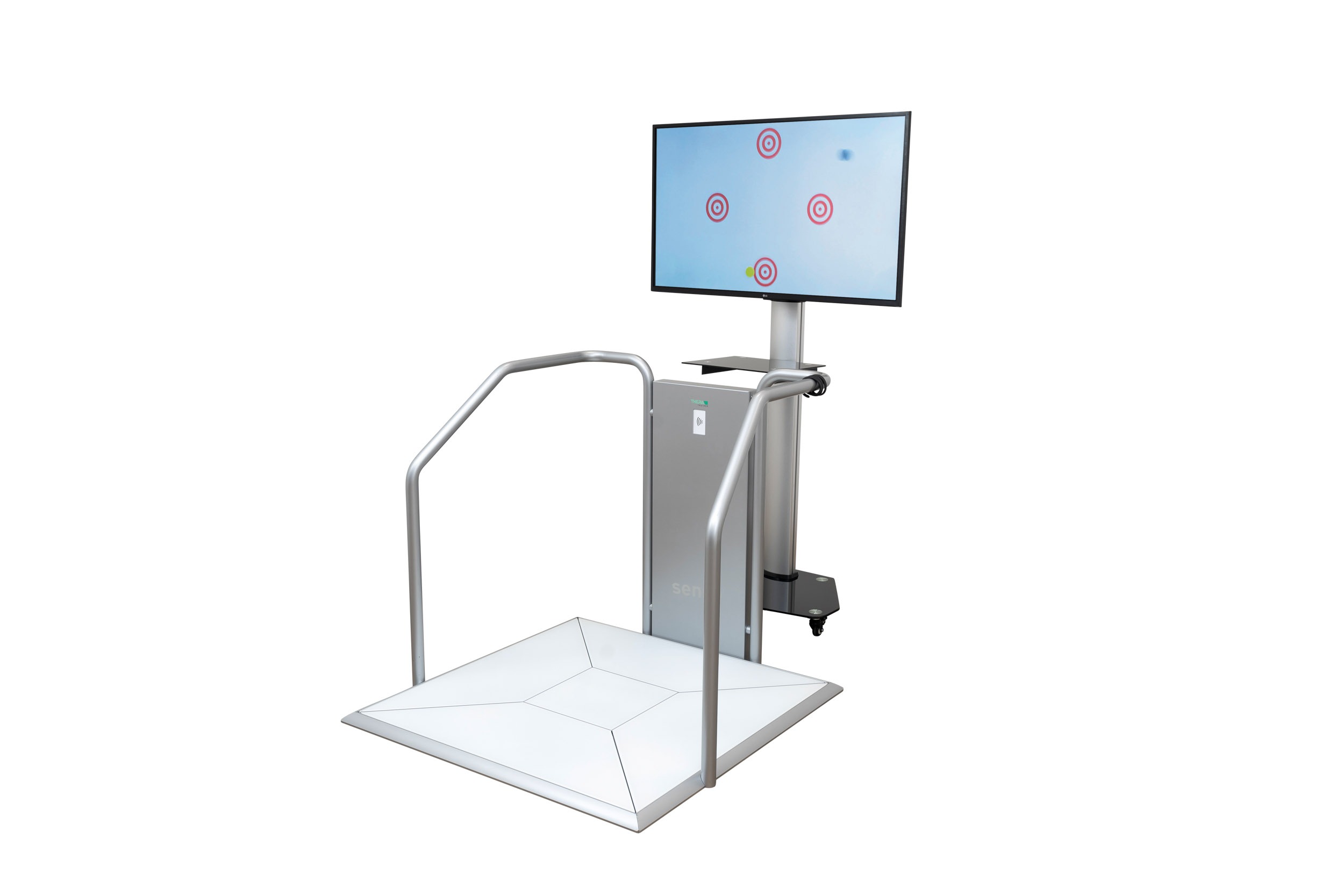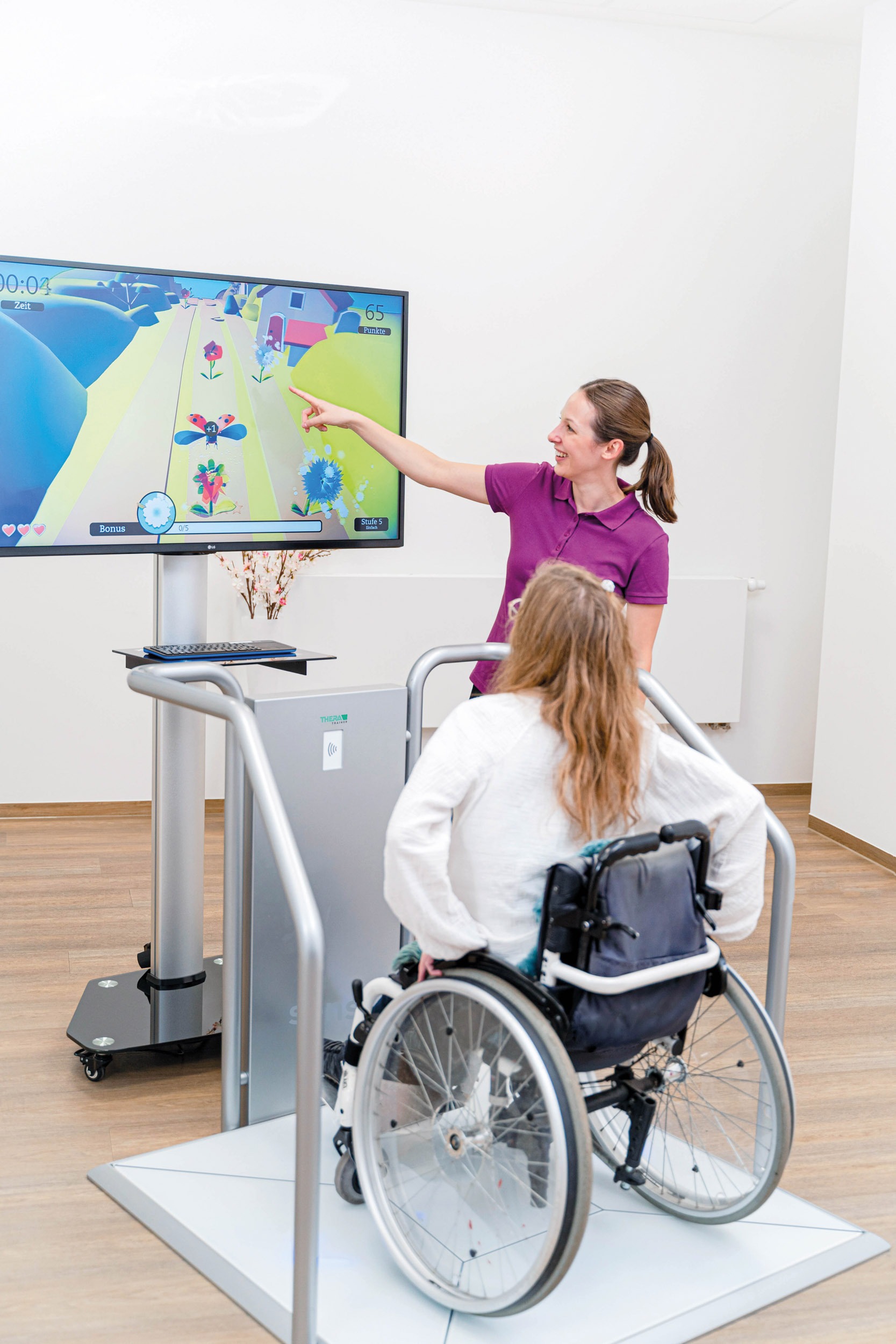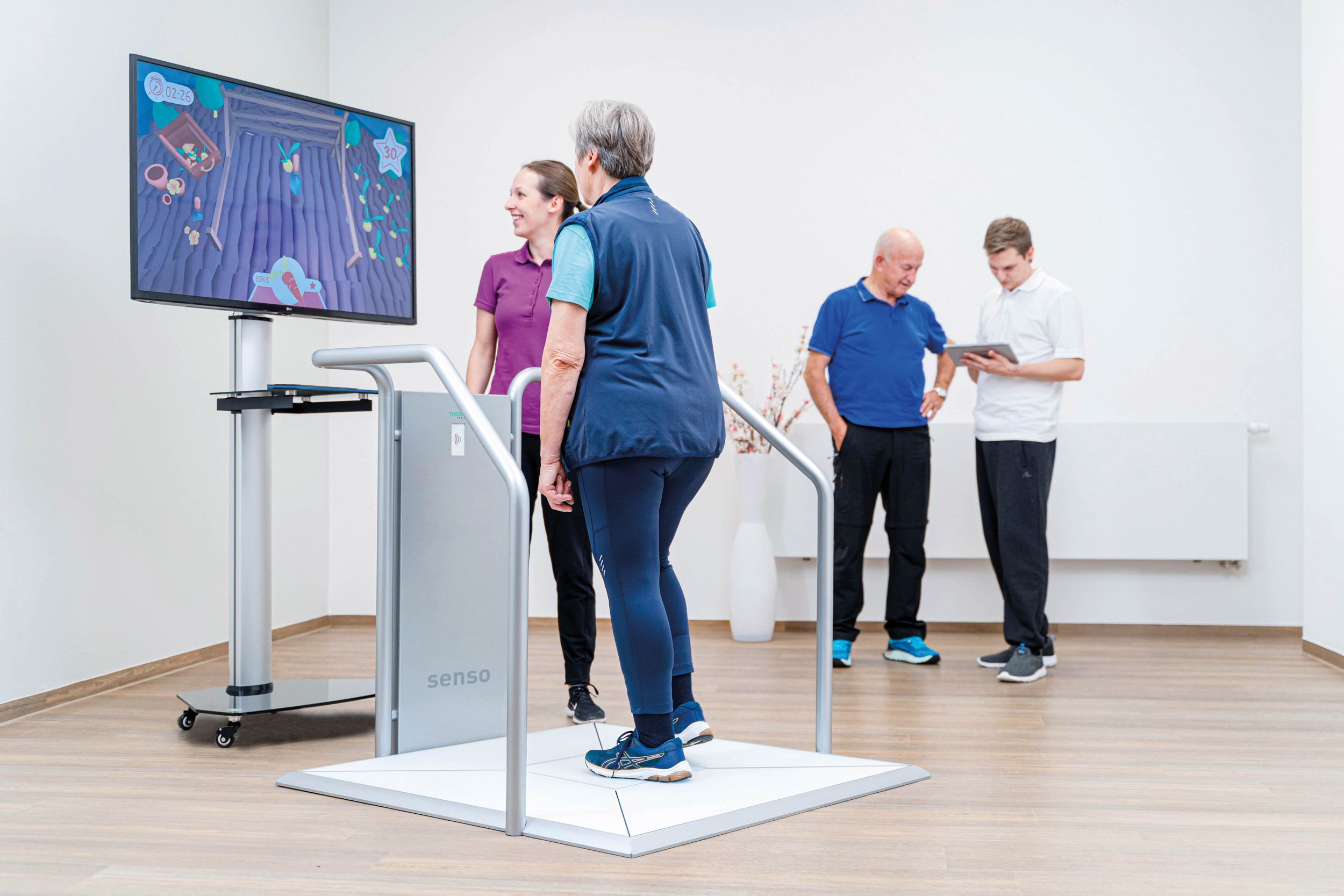
Technologie & Entwicklung
An algorithm for fall prevention

Lars Timm
International Sales Account Manager, THERA-Trainer
Sometimes you have to explore new avenues
The THERA-Trainer senso is a highly efficient training device for improving mental and physical performance and reducing the risk of falls. Numerous scientifically validated training programmes are available. Intelligent algorithms automatically adapt the games to individual performance. Anybody can use the trainer, including wheelchair users.
It all started when Dr Eva van het Reve (Dividat AG) was awarded her doctorate at ETH Zurich. The aim of her research there was to validate a revolutionary training approach for patients with cognitive-motor impairments by combining movement and cognitive tasks. But it soon became clear that there was no suitable training equipment on the market. Necessity is the mother of invention, and so the first prototype of today’s senso was developed.
The first research results with the senso exceeded all expectations. The decision to embark on further research projects and develop the prototype into a market-ready product was clearly the next logical step. After going through several stages of development and a whole series of trials, today’s senso is a unique training device that is supported by scientific evidence and fulfils every technical requirement.
Joris van het Reve (CEO Dividat AG): “We’re very happy that we have THERA-Trainer as a long-term partner who has clearly recognised the genius of this training approach. Thanks to THERA-Trainer’s international distribution network, we can provide optimal therapy to our patients across the world with the senso.”
It all started when Dr Eva van het Reve (Dividat AG) was awarded her doctorate at ETH Zurich. The aim of her research there was to validate a revolutionary training approach for patients with cognitive-motor impairments by combining movement and cognitive tasks. But it soon became clear that there was no suitable training equipment on the market. Necessity is the mother of invention, and so the first prototype of today’s senso was developed.
The first research results with the senso exceeded all expectations. The decision to embark on further research projects and develop the prototype into a market-ready product was clearly the next logical step. After going through several stages of development and a whole series of trials, today’s senso is a unique training device that is supported by scientific evidence and fulfils every technical requirement.
Joris van het Reve (CEO Dividat AG): “We’re very happy that we have THERA-Trainer as a long-term partner who has clearly recognised the genius of this training approach. Thanks to THERA-Trainer’s international distribution network, we can provide optimal therapy to our patients across the world with the senso.”

Body and mind are the cornerstones for safe movements
All movements in our everyday lives rely on a fine interplay of the musculoskeletal system, sensory perceptions and the central nervous system. If one of these systems is out of balance or if they fail to interact with each other as they should, purposeful movement is no longer possible. Movement disorders of the lower extremities in particular can lead to falls with serious health consequences, which also place a heavy burden on the healthcare system. Optimal prevention offers the best protection against serious consequences.
Conventional therapy approaches usually focus on strengthening the musculoskeletal system and either partly or completely neglect the integration of cognitive functions in movement control. However, the latest research results show that in addition to strong muscles, effective control over them is also essential for fall prevention. The importance of cognitive training in relation to fall prevention can be illustrated in the case of patients with dementia. This group of patients has a significantly increased risk of falling, which is almost exclusively due to cognitive impairment.
Peter Kopf (CEO THERA-Trainer) explains it like this: “Imagine you’re standing at a busy junction. You’re carrying a bag of shopping. There are people all around you. It’s loud, it’s hot and you’re exhausted. Due to your age, your eyesight and hearing are limited. In order to cross the road safely, you need to pay full attention to your gait. It is in situations like these that falls occur more frequently. You’re overwhelmed by external stimuli and can no longer concentrate on the essentials, i.e. crossing the road safely. This is where the THERA-Trainer senso comes into play, because it specifically combines movements and simultaneous cognitive stimuli during training.”
The key to the proven high training efficiency of the THERA-Trainer senso lies in precisely this link between cognitive and movement tasks. This unique combination simulates the multi-tasking demands of everyday life in a fun way. This produces synergy effects at the neuronal level, and this training approach is associated with a significantly higher effectiveness than other conventional concepts in this regard. This particularly benefits people who, due to ageing, illnesses or accidents, are confronted with limitations in terms of cognitive function, the musculoskeletal system or the interaction between the two.
Current research results show a significant reduction in the risk of falls, an improvement in cognitive function (reaction time, memory performance etc.) and strengthening of the musculoskeletal system in patients with cognitive or motor impairments after training with the THERA-Trainer senso. Training with the senso goes way beyond static weight-shifting exercises. Due to its unique design, step exercises can also be performed, and the flat entrance even makes it possible to use it with a wheelchair. The high measurement accuracy of the force sensors built into the THERA-Trainer senso also allows clinical balance tests to be carried out.
All movements in our everyday lives rely on a fine interplay of the musculoskeletal system, sensory perceptions and the central nervous system. If one of these systems is out of balance or if they fail to interact with each other as they should, purposeful movement is no longer possible. Movement disorders of the lower extremities in particular can lead to falls with serious health consequences, which also place a heavy burden on the healthcare system. Optimal prevention offers the best protection against serious consequences.
Conventional therapy approaches usually focus on strengthening the musculoskeletal system and either partly or completely neglect the integration of cognitive functions in movement control. However, the latest research results show that in addition to strong muscles, effective control over them is also essential for fall prevention. The importance of cognitive training in relation to fall prevention can be illustrated in the case of patients with dementia. This group of patients has a significantly increased risk of falling, which is almost exclusively due to cognitive impairment.
Peter Kopf (CEO THERA-Trainer) explains it like this: “Imagine you’re standing at a busy junction. You’re carrying a bag of shopping. There are people all around you. It’s loud, it’s hot and you’re exhausted. Due to your age, your eyesight and hearing are limited. In order to cross the road safely, you need to pay full attention to your gait. It is in situations like these that falls occur more frequently. You’re overwhelmed by external stimuli and can no longer concentrate on the essentials, i.e. crossing the road safely. This is where the THERA-Trainer senso comes into play, because it specifically combines movements and simultaneous cognitive stimuli during training.”
The key to the proven high training efficiency of the THERA-Trainer senso lies in precisely this link between cognitive and movement tasks. This unique combination simulates the multi-tasking demands of everyday life in a fun way. This produces synergy effects at the neuronal level, and this training approach is associated with a significantly higher effectiveness than other conventional concepts in this regard. This particularly benefits people who, due to ageing, illnesses or accidents, are confronted with limitations in terms of cognitive function, the musculoskeletal system or the interaction between the two.
Current research results show a significant reduction in the risk of falls, an improvement in cognitive function (reaction time, memory performance etc.) and strengthening of the musculoskeletal system in patients with cognitive or motor impairments after training with the THERA-Trainer senso. Training with the senso goes way beyond static weight-shifting exercises. Due to its unique design, step exercises can also be performed, and the flat entrance even makes it possible to use it with a wheelchair. The high measurement accuracy of the force sensors built into the THERA-Trainer senso also allows clinical balance tests to be carried out.

An asset for patients and clinics
The rehabilitation market is facing unprecedented challenges. An ageing population combined with staff shortages and inevitable cost savings are forcing therapists and rehabilitation facilities to rethink training concepts and explore new avenues. New technology can play a key role in this.
This paradigm shift must not negatively affect the treatment of patients, who must remain the focus of attention. Targeted use of technology such as the THERA-Trainer senso is not only an asset in terms of therapy options, it also takes the strain off the therapists. In addition to the outstanding training effects, the senso is very easy to use and its challenging training character is a standout feature in everyday clinical use. After a short briefing, patients can train independently on the device through user recognition via an RFID wristband. Interactive training content and a visual display of training progress help keep patients motivated. The difficulty of the training session is constantly and automatically adjusted to the patient’s performance thanks to an intelligent algorithm. In this way, a challenging level of training can be guaranteed even without the constant supervision of the therapist. This can also help to relieve the pressure on limited resources.
Sabine Lamprecht (physiotherapist MSc Neurorehabilitation, HSH Lamprecht GbR): “The THERA-Trainer senso enabled me to motivate patients who were in fact unmotivatable.”
The rehabilitation market is facing unprecedented challenges. An ageing population combined with staff shortages and inevitable cost savings are forcing therapists and rehabilitation facilities to rethink training concepts and explore new avenues. New technology can play a key role in this.
This paradigm shift must not negatively affect the treatment of patients, who must remain the focus of attention. Targeted use of technology such as the THERA-Trainer senso is not only an asset in terms of therapy options, it also takes the strain off the therapists. In addition to the outstanding training effects, the senso is very easy to use and its challenging training character is a standout feature in everyday clinical use. After a short briefing, patients can train independently on the device through user recognition via an RFID wristband. Interactive training content and a visual display of training progress help keep patients motivated. The difficulty of the training session is constantly and automatically adjusted to the patient’s performance thanks to an intelligent algorithm. In this way, a challenging level of training can be guaranteed even without the constant supervision of the therapist. This can also help to relieve the pressure on limited resources.
Sabine Lamprecht (physiotherapist MSc Neurorehabilitation, HSH Lamprecht GbR): “The THERA-Trainer senso enabled me to motivate patients who were in fact unmotivatable.”
Technology & Development
THERAPY 2023-III
THERAPY Magazine

Lars Timm
International Sales Account Manager, THERA-Trainer
Lars Timm studied Sports
Science with a focus on
rehabilitation in Freiburg i.Br.
and M.Sc. Sports Engineering
at KIT Karlsruhe.
References:
Related contents
Find related exciting contents in our media library.
Mehr laden
This is not what you are searching for? Knowledge
Meet our specialists.
Are you interested in our solutions? Schedule a meeting with a Consultant to talk through your strategy and understand how TEHRA-Trainer can help you to advance rehabilitation.